
We know how to reduce homicides in Latin America. Where’s the political will?
Before 2018 is over, more than half the population of Latin America will have elected a new president.

Before 2018 is over, more than half the population of Latin America will have elected a new president.

As she began to run afoul of a street gang in her working-class neighborhood in Medellín, Lina Carmona always kept a three-digit phone number in the back of her mind.

Nicaragua’s political crisis is spinning out of control, with political tensions rising to levels not seen since the 1970s, during the country´s revolution to oust the Somoza dictatorship.
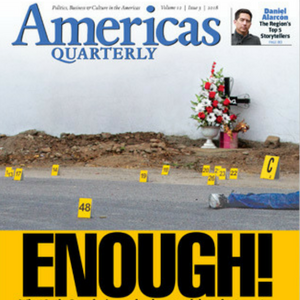
Overall, the past quarter-century has been an era of progress for the region: Democracy has spread.

In a murder-plagued Brazilian city, a legislator pushes against popular clamor for hard-line enforcement.
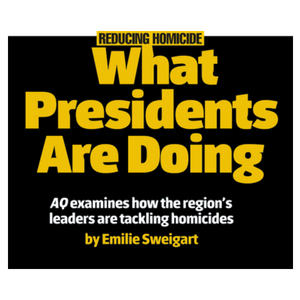
The murder epidemic in Latin America is an appalling tragedy. But it is also an incredibly complex public policy challenge stemming from problems that have plagued the region for decades

Nicaragua is taking a dangerous turn toward civil war. Since protests and riots began three months ago, Nicaraguan soldiers, police and paramilitary groups have killed more than 280 people and injured 1,800 others.

There are ominous signs of growing turbulence around the world. The number of civil wars has doubled since 2001 – jumping from 30 to 70. The number of people killed in these armed conflicts has increased tenfold since 2005.

This article explores the participation of uniformed personnel (military and police) from Latin America and the Caribbean in United Nations (UN) peacekeeping operations, through data analysis covering the period of 1990 to 2017.

En Argentina y México, las leyes han sido reformadas con miras a introducir el principio del “donante presunto” y ampliar la cantidad de órganos disponibles para trasplantes. Esa figura atiza viejos temores. Un análisis.

Latin America accounts for 8% of the world’s population, but 33% of its homicides. A history of military repression, drug wars and dictatorships have made the region the most violent on earth, but now, new methods of preventing violence are springing up there.

Most technologies are dual use: take the case of digital technologies that are fundamentally transforming governance, markets and development for the better.

Two young men are lying face down on the green forest floor. His friend, he says, is the one in the dark shirt, the one whose skull has been hacked open by a machete.

The global migrant crisis is transcending borders, defining itself as one of the most important issues of our time. It’s fueling a growing political debate and a political divide on how to confront it.
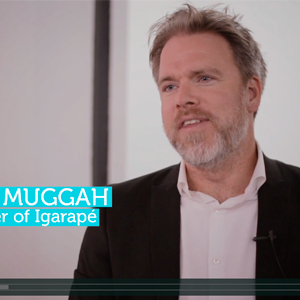
To Robert Muggah cities are places where people connect, feel safe and live. Places where people thrive and express creativity.

A new website that lets people delve into data on the world’s cities has been launched.
Dr Robert Muggah from the think-tank Instituto Igarapé showed the BBC some of his favourite maps from EarthTime.

Africans are moving to the city. Already home to the world’s youngest and fastest-growing population, the continent is urbanizing more rapidly than any other part of the planet.

Furious at corrupt politicians and fearful of deteriorating security, many Brazilians are calling for a military intervention to clean house of crooked leaders and crack down on heavily armed drug gangs.

Did President Trump manufacture a border crisis where none existed?

A new website that lets people delve into data on the world’s cities has been launched.
Dr Robert Muggah from the think-tank Instituto Igarapé showed the BBC some of his favourite maps from EarthTime.

The images of children being forcibly separated from their parents at the U.S.-Mexico border are shocking by any standard.
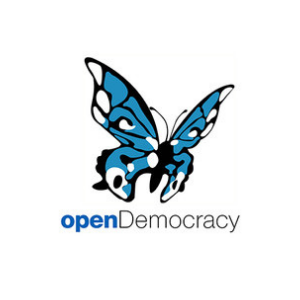
The US Attorney General claims these separations are justified by the Bible and will deter illegal immigration, though there is no evidence backing either claim. His is a minority position.

Today’s cities are on the frontline of crime and terrorism. While some of them are clearly more at risk than others, all of them are vulnerable.

The risk of cyber crime is growing in Brazil amid a debate over the balance between security and privacy. Robert Muggah and Nathan B. Thompson analyse the nature of the threat and consider the response of the state in a climate of significant economic and political uncertainty

En Foro Global, Genaro Lozano entrevista a Robert Muggah, colaborador de Americas Quarterly y cofundador y director de investigación del Think Tank Instituto Igarapé de Río de Janeiro.

Millennials are an ethical bunch. Veganism is on the rise, primarily down to the environmental impact of meat production and animal welfare issues. At universities, statues of historic British figures are squabbled over due to their racism or imperialism. Abortion; assisted suicide; racial profiling by the police; clothes manufacturing; bamboo coffee cups.
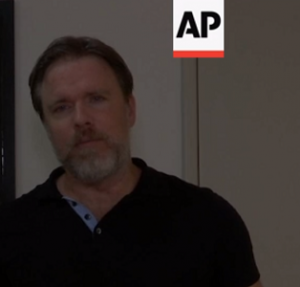
Rising homicide rates are damaging Brazil’s economy and leading to skyrocketing public security costs.

Report finds that crime has worsened and lays out the cost over two decades

A new study shows that violence costs Brazil more than 4 percent of GDP. Here’s how security policy could be more cost-effective.

Rising homicide rates are damaging Brazil’s economy and leading to skyrocketing public security costs, according to a study released Monday.

O Instituto Igarapé utiliza cookies e outras tecnologias semelhantes para melhorar a sua experiência, de acordo com a nossa Política de Privacidade e nossos Termos de Uso e, ao continuar navegando, você concorda com essas condições.

